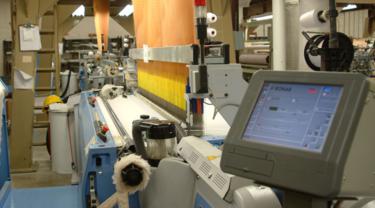
MW Canada has the right export details to be a leading global company
If Bob Berger’s ancestors could see what he exports today, they would be astonished.
As president of Cambridge, Ontario’s MW Canada, Berger leads one of the textile industry’s most innovative companies. MW Canada exports 97 per cent of its production of high-quality specialty textiles and is recognized for its ongoing development of industry-leading technologies, notably technical textiles.
Dubbed the future of the industry, technical textiles include materials now being used in cutting-edge healthcare, filtration and ‘smart’ wearable products.
Market experts suggest technical textiles will be in demand in every industry, from defence and energy, to mining, construction and transportation, with annual demand anticipated to generate tens of billions of dollars in sales.
It’s a big shift for the long-suffering textile industry, hit hard in recent years by numerous trade agreement restrictions, foreign competition and a fluctuating Canadian dollar.
Through continual innovation and adaptation to change, however, MW Canada has exported successfully since the early ‘80s. While the majority of MW Canada’s exports are sold to the U.S., the manufacturer also ships orders to Mexico, South America, India, China and Europe.
“Canada has a good reputation for unique and quality products around the world,” Berger said. “That being said, customers don’t care where they buy from. Quality, service, price, delivery – they want it all. If you want to be successful in the global marketplace, you have to be ahead of the game and never be happy with what you have. If you stay the same, you fall behind – you’ll be gone.”
To keep up with global trends, Berger travels around the globe every other year to assess the latest trends in the industry and to identify gaps in the market.
“I go to see what they (companies in the industry) are making and what they’re really good at. I then focus on doing the things they are not good at,” he explained. “Sometimes there will be something in production that’s hot, and they can make a ton of it very quickly in China or elsewhere and fill the marketplace. But it will be history in two years. You don’t even try to compete. You have to understand your capabilities, their capabilities and where you fit in.”
In Berger’s view, global export success is also a matter of nurturing each market individually.
“People buy from people they like,” he explained. “You have to have the right people, and be trustworthy and reputable in each market. Sometimes you have to go through a few people to find the right one. There is no shortcut to it, and sometimes you have to start over again after two years.”
He says geography doesn’t limit textile sales, noting that selling to a customer in Canada and one on another continent is the same in the textile industry, Berger noted.
“It’s about being consistent and making sure they know what you can do and what you can’t do, saying what you do and doing what you say,” he said. “Nothing happens overnight.”
Regardless, selling globally can generate new, unforeseen challenges.
“There are a lot of details and you have to get the details right. It’s all about your reputation and repeat business (in the global economy). There is no secret to success,” he said. “Nobody’s perfect, but if you have a problem, you have to be above board and resolve it. If you don’t, not only will you lose the customer, everyone in the market will know it. It wasn’t like that 30 years ago, but today it’s the norm.”
Successfully filling export and domestic orders also means a focus on teamwork in Berger’s view. MW provides a staff person to oversee each employee’s learning path, goals and progress through completion of online courses on math, management and more.
MW Canada also has a full-time engineer focused on funding R&D projects and liaising with university scientists.
Among its products now in development, the company is working on producing solar window coverings that can gather and store electricity to power home gadgets.
“Technology is the future of our business. Any project we are involved in could change the future of materials science,” Berger says. “We can now store enough power in the headrail of the solar blind to raise and lower it several times a day, but breakthroughs in solar panel efficiency are needed. With solar or other technologies, we don’t have to be first with it necessarily, but we don’t want to be last and we certainly have to understand it.”
















